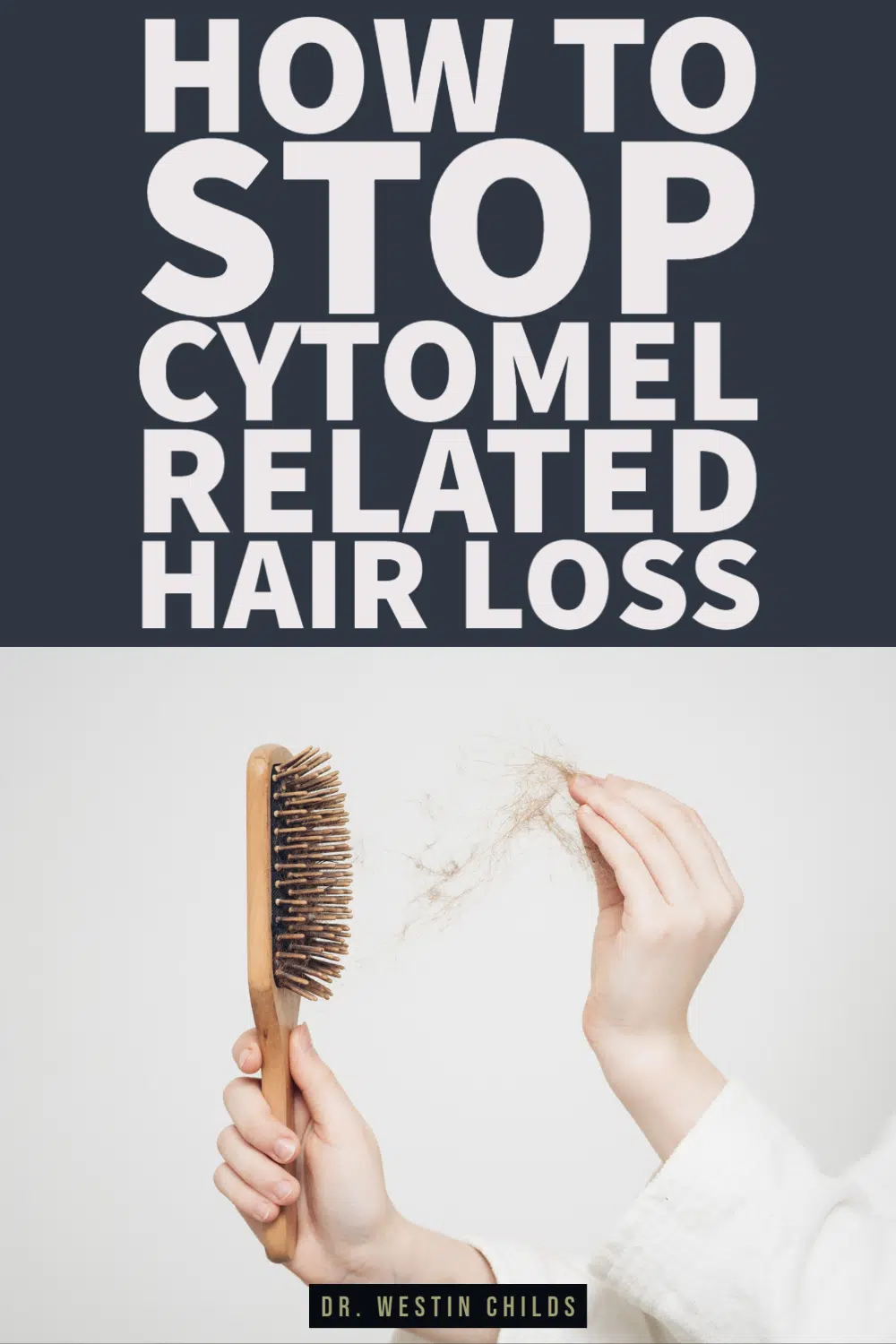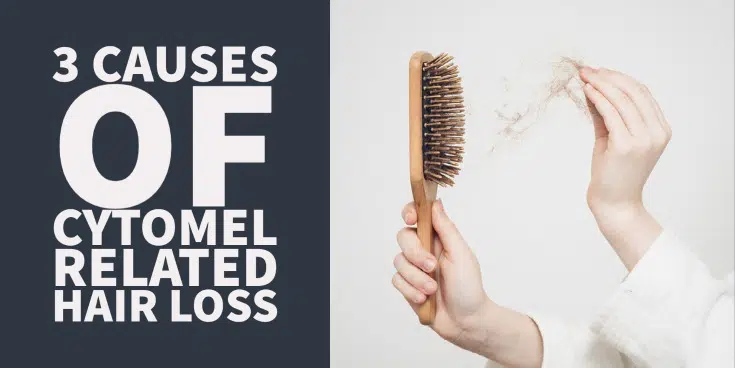If you are new to Cytomel, or if you’ve been using it for a long time, this information should be helpful!
While Cytomel is probably one of my favorite medications used to treat hypothyroidism and Hashimoto’s, it doesn’t come without risks and potential side effects.
Among these side effects includes the potential for hair loss.
Don’t let this freak you out, however, because it can usually be treated very easily and most people experience hair GROWTH as long as they use it correctly.
This article will focus on the 3 main causes of Cytomel-related hair loss and how to deal with each one.
DOWNLOAD FREE RESOURCES
Foods to Avoid if you Have Thyroid Problems:
I’ve found that these 10 foods cause the most problems for thyroid patients. Learn which foods you should avoid if you have thyroid disease of any type.
The Complete List of Thyroid Lab tests:
The list includes optimal ranges, normal ranges, and the complete list of tests you need to diagnose and manage thyroid disease correctly!
Cytomel and Hair Loss
What exactly is Cytomel?
Cytomel is a brand-name thyroid medication that contains only the thyroid hormone T3.
T3, as many of you are probably aware, is the single most powerful and biologically active thyroid hormone (1) that you can take which makes this medication the strongest thyroid medication available on the market.
This is both good and bad!
Good because it can potentially help many of you reading this and bad because many doctors are afraid to use it.
But, let’s get a few things straight:
#1. Cytomel should be respected but not feared.
#2. Cytomel is a potentially GREAT thyroid medication and can be used in conjunction with other thyroid medications such as Synthroid and levothyroxine.
#3. Most people who use it will NOT experience hair loss (in fact, they will probably experience hair growth).
And #4. All of this information here applies to BOTH Cytomel and liothyronine.
Cytomel is the brand name T3-only thyroid medication while liothyronine is the generic equivalent.
And in my experience, both medications can cause, exacerbate or worsen existing hair loss.
The good news is, however, that in most cases it can be treated and reversed but it does require that you have some basic understanding of this medication and how it works in your body.
As a last special note, it’s also important for you to understand that Cytomel does not always cause hair loss or any of the symptoms I’m listing below.
In terms of the percentage of those who start Cytomel and do well, the vast majority of patients, as long as they are dosed correctly, find that they feel dramatically better and do not experience any negative side effects.
Perhaps only around 20% (again, in my experience) of people who start Cytomel will experience hair-related issues.
That means there is roughly an 80% chance that you will not have to deal with these issues.
With this in mind, let’s talk about some of the reasons that Cytomel causes hair loss.
#1. Side Effect of Cytomel Itself
The first reason has nothing to do with the T3 thyroid hormone in the medication but instead is probably related to the fillers, dyes, and binders found within.
It has been shown that Cytomel, the medication itself (2), can cause temporary hair loss in some patients who use it.

This hair loss has NOTHING to do with your dose (which is very important because the dose can play a role as we will discuss below).
This cause of hair loss has to be differentiated from the other causes of Cytomel-related hair loss because it is reversible and usually fades over time without any intervention or changes on your part.
You can compare this to the other causes we are going to discuss which require some changing of your dose in order to fix them.
The hair loss associated with this condition can be mild to moderate but it is typically a noticeable amount.
In my experience, patients are often very aware that it is happening, especially because they are usually sensitive to hair loss due to their diagnosis of hypothyroidism.
What to do about it:
The most important thing for you to do is not to get upset or freak out because you are noticing you are losing more hair.
Be patient!
Your best bet is to continue taking your prescribed dose and to retest your thyroid lab tests to determine that your dose is adequate (not too low and not too high).
If you have confirmed that your dose is optimal then your next step is to simply wait it out.
Most of the time, you will find that your hair will start to regrow within about 2 to 4 months.
If you go beyond that timeframe and you are still experiencing hair loss then it may be time to look at your dose or to consider other thyroid medications and options.
#2. Taking Too Much Cytomel
The next reason that some people experience hair loss when taking Cytomel has to do with taking too much of it.
This one is a no-brainer and is really the thing that most doctors are afraid of when prescribing this medication.
They fear that by giving your body T3 directly that you will become hyperthyroid.
In addition to causing dry, brittle hair, hyperthyroidism can also cause hair loss directly (3).
And make no mistake, Cytomel can cause your body to become hyperthyroid.
But it will only cause hyperthyroidism if you take too much of it.
Most people who use Cytomel can use it without becoming hyperthyroid by watching their labs carefully and ensuring that their free T3 and total T3 do not become elevated and that their TSH is not suppressed.
So don’t let this scare you.
What to do about it:
The good news is that this side effect is actually quite easy to identify, at least compared to the other causes, because it’s often associated with other side effects as well.
For instance:
If you are taking too much Cytomel you will probably also be experiencing symptoms which include heart palpitations, diarrhea, heat intolerance, anxiety, and jitteriness.
If you are experiencing any of these symptoms, in addition to hair loss, then it’s likely that your dose is too high.
You can confirm this by checking your thyroid lab tests.

You want to pay close attention to your free T3, total T3, and TSH as these tests will give you the most information about your body’s thyroid status.
If you find that your free/total T3 is elevated and that your TSH is suppressed then you may want to consider lowering your dose to bring your thyroid labs back into range.
As this happens, you should notice that your hair loss improves.
#3. Not Taking Enough Cytomel
This is probably the most common cause of hair loss after starting Cytomel and it tends to be dose-related but this time it’s related to not taking enough.
Why does this happen?
Most doctors, because they aren’t used to prescribing T3 medications such as Cytomel, tend to start with very low doses to be cautious.
This cautious approach isn’t necessarily bad, but it can cause issues if you are consistently underdosing patients especially if you are being transitioned from other thyroid medications such as levothyroxine.
If you are not taking a sufficiently high dose of Cytomel then your body will be in a hypothyroid state.
And you know, probably from experience, that the hypothyroid state is not only associated with hair loss but also with symptoms such as fatigue, constipation, depression, weight gain, and cold intolerance.
And these symptoms are particularly helpful in determining if your dose is too high, too low, or if your hair loss is a consequence of the medication itself.
What to do about it:
The good news is that this condition is readily treatable and the therapy is to simply increase your total dose of thyroid medication.
As you increase your dose you will bring your body into a euthyroid state (meaning a state of normal thyroid function) which will provide stimulation to your hair follicles (4).
You can do this by simply increasing your dose of Cytomel or by increasing other thyroid medications that you may be taking.
As you increase your dose, you will want to pay close attention to your total T3 and TSH.
As your total T3 approaches the top of the reference range, and as your TSH approaches the ‘optimal’ level you should find that your hair loss stops.
If you aren’t sure what ‘optimal’ thyroid lab tests look like then I would recommend that you read this detailed article for more information.
#4. Other Causes Not related to Cytomel
I had to throw this one in here because there are plenty of other reasons that thyroid patients may experience hair loss that are not related to their medication.
These causes include conditions such as nutrient deficiencies, autoimmune diseases (5), and other hormone imbalances.
These can typically be differentiated from Cytomel-related hair loss because they should already be pre-existing when you start your medication.
We aren’t going to talk about them in detail, but just realize that you may have other issues contributing to your hair loss not listed in this article.
Should you Avoid Cytomel?
I know it may sound like Cytomel is a medication worth avoiding, especially in the face of all of the issues that I’ve discussed here.
I’m here to tell you that I find that in almost every situation, however, the benefits of using Cytomel tend to far outweigh the potential cons.
This medication, including the generic version liothyronine, can potentially stand to help many of you out there reading this.
In addition, even those already suffering from hair loss, at least of the patients that I tend to treat, usually see an improvement in their hair growth after using Cytomel (6).
This isn’t universally true, however, and each person should be evaluated on a case-by-case basis.
But I don’t want you to believe that the majority of people struggle with these issues after they start the medication.
In fact, the opposite is quite true.
Most people do very well.
But for those people who do suffer from hair loss after starting, they need a resource to help them and this is exactly what this blog post is designed to do.
Conclusion
Does Cytomel cause hair loss?
It can, but not always.
If it does cause hair loss, it’s most often due to 1 of 3 major causes.
#1. Hair loss directly related to the medication (this is typically temporary and will go away without any treatment).
#2. Hair loss related to an excessively high dose (this can be treated by lowering your dose).
#3. Hair loss related to insufficient medication (this can be treated by increasing your dose).
If you are experiencing hair loss or if it worsened after taking Cytomel, then be sure to figure out which of these 3 causes is your main issue.
From there you should be able to find your treatment and regrow your hair!
Now I want to hear from you:
Are you currently suffering from Cytomel-related hair loss?
Do you know what is causing it?
What therapies have you tried?
Have they worked?
Leave your questions or comments below!








